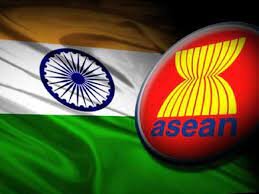The 9th ASEAN-India Senior Officials conference on Transnational Crimes (SOMTC) was held virtually today. At the meeting, both parties vehemently denounced terrorism in all of its manifestations and emphasized the importance of stepping up global cooperation in the fight against terrorism and transnational crimes.
The Consultation was co-chaired by representative from India and ASEAN. Mahaveer Singhvi, Joint Secretary (Counter Terrorism), Ministry of External Affairs, represented India at the consultation, and Puah Kok Keong, Deputy Secretary (Policy), Ministry of Home Affairs, Singapore, represented the ASEAN.
“Both sides strongly condemned terrorism in all its forms and manifestations and emphasized the need to strengthen international cooperation to combat terrorism and transnational crimes in a comprehensive and sustained manner,” the Ministry of External Affairs said in a statement. See here.
In the context of the ASEAN-India Work Plan to combat transnational crimes, the two sides discussed ways to improve cooperation, among other things, in the areas of terrorism, illicit drug trafficking, human trafficking, international economic crime, and cybercrime.
The two sides also discussed institutional ties and capacity-building initiatives.
In 2024, Indonesia will host the 10th ASEAN-India SOMTC Consultation on Transnational Crimes.
India and the ASEAN
In the midst of escalating tensions among the post-colonial states of the Asia-Pacific, the Association of Southeast Asian Nations (ASEAN) was founded as a regional organization to support political and social stability. ASEAN’s motto is “One Vision, One Identity, One Community.” The Secretariat of ASEAN is located in Jakarta, Indonesia.
India adopted the “Look East Policy” (LEP) shortly after economic liberalization in 1991 to strengthen economic and commercial ties with East and Southeast Asian countries, marking a significant departure from the policies of the Cold War era.
In 1992, India started a formal dialogue with ASEAN as a “Sectoral Dialogue Partner” and later as a “Dialogue Partner” in 1996. The initial phases as a Dialogue Partner (DP) involved communication at the Foreign Minister level, which was promoted to the Summit level in 2002 when the first such Summit level meeting took place.
India unveiled its Act East Policy in 2014 with the goal of stepping up its engagement with ASEAN member countries. The 3 C’s of Connectivity, Commerce, and Culture are emphasized as the core areas of action for a deeper ASEAN-India integration in the Act-East Policy.
India’s dialogue partnership subsequently advanced to a strategic partnership at the 20-year Commemorative Summit Meeting held in New Delhi in December 2012.
At the 25th Anniversary Commemorative Summit in January 2018, India and ASEAN concurred that the primary goal of their strategic partnership would be to advance maritime cooperation.
The year 2022 marks the 30th anniversary of ASEAN-India relations, and the leaders designated it as the ASEAN-India Friendship Year in October 2021.
Compared to the EU and North American markets, ASEAN has one of the largest global markets. It is also the world’s fourth most popular destination for the investment.
In order to counter China’s power projection in the region, collaboration between India and ASEAN is extremely important.
India and ASEAN both have territorial and border issues with China. ASEAN has disagreements with China over the South China Sea islands and waters, whereas India has concerns about land borders.
To make it easier for India to join regional and international supply chain movements, there needs to be more engagement with ASEAN.
India’s energy security could potentially benefit from the support from ASEAN countries, particularly from Myanmar, Vietnam, and Malaysia. Additionally, regional cooperation could be used to explore the oil and natural gas reserves located in the South China Sea region.
Similar to ASEAN, which will bear the burden of a smaller share of the working age population and a higher median age of workers, India, with its enormous demographic dividend, can offer a human resource base.
Indian engagements on a bilateral and multilateral basis with the nations in the Indo-Pacific region are essential for advancing India’s geostrategic interests in the region.













